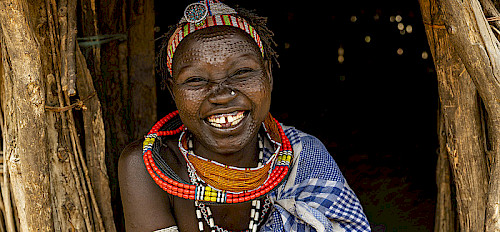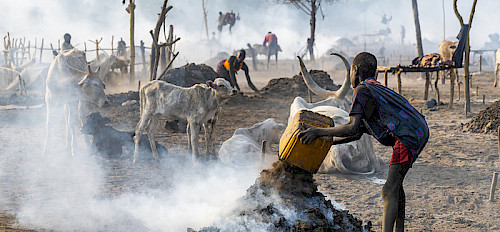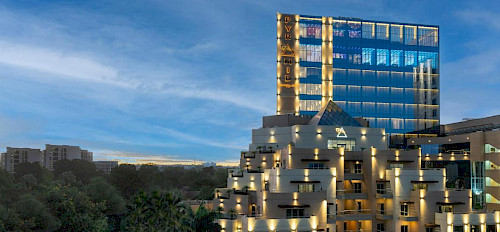
| Duration | 5 days |
| Destinations | South Sudan Tours |
Travel on a captivating 5 Days South Sudan Eastern Tribes adventure through South Sudan, exploring the rich traditions of its Eastern tribes. From the bustling...
More Details
| Duration | 6 days |
| Destinations | South Sudan Tours |
Dive into the untouched beauty and rich cultural traditions of South Sudan on this unique 6 days South Sudan tour. From the bustling capital city of Juba to...
More Details
| Duration | 3 days |
| Destinations | South Sudan Tours |
Explore Juba, the capital of South Sudan, on this exciting 3 days Juba Tour in South Sudan. Located along the White Nile, Juba is a vibrant city that blends...
More DetailsSouth Sudan Tours: South Sudan, a country that emerged in 2011, offers an exciting and unique destination for intrepid travelers. Despite facing periods of unrest, it has transformed into a place rich in cultural diversity and natural beauty. The cultures of South Sudan remain largely untouched by modern influences, giving visitors an authentic experience of rural life.
Boma National Park
Known for hosting the world's second-largest animal migration, Boma National Park is a haven for wildlife lovers. It’s home to vast herds of antelope, elephants, and buffalo, making it a must-see destination for ecotourists.
Mundari Tribe
Renowned for their cattle-centered culture, the Mundari people offer a glimpse into one of the world's most fascinating traditional lifestyles. Visitors on a South Sudan tour can witness their daily life and stunning cultural practices.
Toposa Tribe
Located near South Sudan’s border with Kenya, the Toposa people are known for their intricate beadwork and customs. A visit here allows you to delve into their vibrant traditions.
Bandigiri National Park
This park features diverse wildlife and picturesque landscapes, perfect for nature lovers looking to explore South Sudan’s rich biodiversity.
The White Nile
One of the world’s most iconic rivers, the White Nile flows through South Sudan, offering opportunities for scenic boat tours, fishing, and serene moments amidst stunning riverine views.
Wrestling in Bor
Traditional wrestling competitions are a highlight in the town of Bor, showcasing cultural pride and athletic skill. Watching these events is a unique and unforgettable experience
South Sudan’s cultural richness is unmatched, making it a must-visit destination for those exploring a South Sudan tour. With 64 ethnic groups contributing to the country’s vibrant diversity, each group brings unique traditions, languages, and customs, creating a rich tapestry of cultural expressions that shape the nation’s identity. From the Dinka, Nuer, and Shilluk to the Zande, Bari, and many others, each community showcases distinct ways of life, including traditional music, dances, crafts, and clothing. The country's cultural heritage is deeply rooted in oral traditions, with storytelling and songs playing a vital role in preserving history and customs. Festivals, rituals, and ceremonies remain central to community life, offering visitors a glimpse into living cultural traditions.
The Mundari, a fascinating highlight of any South Sudan tour, are renowned for their distinctive pastoral way of life, with cattle herding at the heart of their culture. Their wealth is traditionally measured by the number of cattle they possess. Rich in heritage, the Mundari uphold unique customs, rituals, and a strong communal bond. Age-old rites of passage are a key part of their practices, and their clothing often features body decorations such as beads and animal skins. Cattle are integral to their existence, providing sustenance and income, while also playing a vital role in ceremonies and spiritual rituals. Despite challenges such as conflict and environmental shifts, the Mundari remain deeply rooted in their pastoral traditions.
Another highlight of cultural tours in South Sudan is the opportunity to visit the Toposa tribe. This group is known for their distinctive body art, clothing, and their traditional farming and cattle-herding practices. You'll learn about their beliefs, social structures, and vibrant ceremonies that have been passed down through generations.
In South Sudan, one of the notable cultural landmarks is the Roman Catholic Diocese of Torit, which oversees numerous historic churches across the region. The diocese, established in the 1960s, plays a significant role in the spiritual and educational life of the country. In addition to its religious significance, many of these churches, especially those located in Torit and surrounding areas, are revered for their architectural beauty and historical importance.
These churches offer a glimpse into the early Christian presence in South Sudan, often situated in remote, picturesque areas that make them must-visit attractions for South Sudan tours. As the country continues to recover from the effects of conflict, these ancient religious sites stand as significant cultural landmarks and a testament to the resilience of its people.
Father John Lee Tae-seok (1962-2010), also known as "Father Jolly," was a Korean priest and doctor whose life and work left a lasting impact on South Sudan. Born in Busan, South Korea, as the ninth of ten children in a Catholic family, he graduated from medical school in 1987 and served as an army surgeon until 1990. In 1991, he entered a Salesian seminary and was ordained as a priest in 2001. Father Lee dedicated his life to serving the people of Tonj, South Sudan, from 2001 to 2008, where he established a small clinic that treated over 300 patients daily. His medical expertise helped cure individuals suffering from leprosy, and he also worked tirelessly to build schools and other educational facilities for the youth of Tonj.
Father John Lee Tae-seok's selfless work in South Sudan has not only left a profound legacy in the field of healthcare and education but also contributed to a growing interest in South Sudan tours by Korean tourists. His story has inspired many, and the release of a documentary about his life has sparked a deeper connection between South Korea and South Sudan.
The duration of your trip in South Sudan depends on your travel goals: On average, you need 6-12 days to fully explore the highlights of South Sudan. If you're interested in cultural experiences, historical sites, and meeting local communities, a 6-day South Sudan tour may be sufficient to visit key destinations such as Juba, the capital city, and other prominent locations like the archaeological sites of Nubian pyramids or wildlife reserves like the Boma National Park. However, if your goal is to explore South Sudan's natural beauty, go on a safari, or immerse yourself in more remote and less-accessible regions, a 12-day itinerary would allow for a more relaxed pace, offering the opportunity to visit several national parks, experience the diverse landscapes, and engage in community-based tourism.
Obtaining a visa is a crucial step for visiting South Sudan, as it is a mandatory requirement for most travelers. Without a valid visa, entry into the country will be denied at immigration points. The process involves submitting an application to the South Sudan embassy or consulate, where travelers must provide necessary documentation, such as a valid passport, recent photographs, and details of their travel itinerary. Depending on the purpose of the visit—whether for tourism, business, or work—the specific visa requirements and processing times may vary. It is important to apply well in advance, as the visa approval process can take time. Additionally, travelers should be aware of any specific health or security requirements, including vaccinations or travel advisories, that may be in place. Ensuring that all visa requirements are met will help ensure a smooth and hassle-free entry into South Sudan.
A visa for South Sudan typically costs $100, but prices may vary based on your nationality and visa type. Check the latest visa requirements through your local South Sudan embassy or consulate to avoid unexpected delays.
Traveling in South Sudan offers a rewarding experience with the right preparation. Hiring a knowledgeable guide or tour operator is highly recommended to navigate remote areas, ensuring both safety and enjoyment throughout your journey. With careful planning, you can also manage the challenging infrastructure. Outside of Juba, expect rocky roads, making reliable 4x4 vehicles essential for long-distance travel.